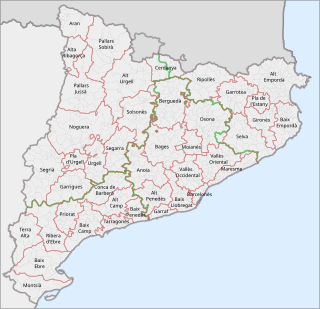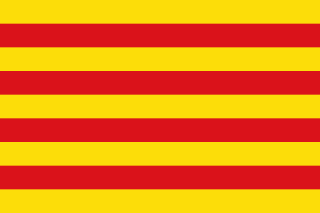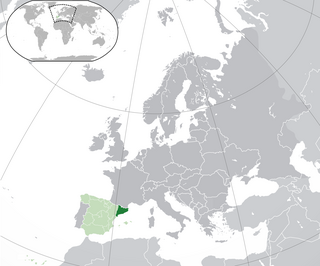
This is a list of the 42 comarques into which Catalonia is divided. A comarca is a group of municipalities, roughly equivalent to a "county" in the U.S.A. or the U.K. However, in the context of Catalonia, the term "county" can be a bit misleading, because in medieval Catalonia, aside from the kings of Aragon, the most important rulers were counts, notably the Counts of Barcelona and of Urgell. Comarques have no particular relation to the "counties" that were ruled by counts.
The Government of Catalonia or the Generalitat de Catalunya is the institution under which the Spanish autonomous community of Catalonia is politically organised. It consists of the Parliament of Catalonia, the President of the Generalitat de Catalunya, and the Executive Council of Catalonia.
The Republican Left of Catalonia is a pro-Catalan independence, social-democratic political party in the Spanish autonomous community of Catalonia. It is also the main sponsor of the independence movement from France and Spain in the territories known as Catalan Countries. Occitan Republican Left, formed in 2008, acts as the Aranese section of the party.

Catalan nationalism is the ideology asserting that the Catalans are a nation.
Initiative for Catalonia Greens is an eco-socialist political party in Catalonia. It was formed as a merger of Iniciativa per Catalunya and Els Verds. IC had been an alliance led by Partit Socialista Unificat de Catalunya and was the equivalent of Izquierda Unida in Catalonia. IC later developed into a political party, and PSUC was dissolved.

The Socialists' Party of Catalonia is a social-democratic political party in Catalonia, Spain resulting from the merger of three parties: the Socialist Party of Catalonia–Regrouping, led by Josep Pallach i Carolà, the Socialist Party of Catalonia–Congress, and the Catalan Federation of the PSOE. It is the Catalan referent of the Spanish Socialist Workers' Party (PSOE), and its Aranese section is Unity of Aran. The party had also been allied with federalist and republican political platform Citizens for Change until the 2010 election. PSC–PSOE has its power base in Barcelona metropolitan area and comarques of Tarragonès, Montsià, and Val d'Aran.
The Executive Council of Catalonia or the Government of Catalonia is the executive branch of the Generalitat of Catalonia. It is responsible for the political action, regulatation and administration of the government of the autonomous region.

The Catalan independence movement is a social and political movement with roots in Catalan nationalism, which seeks the independence of Catalonia from Spain.
The constitutional status of Catalonia is currently subject to a dispute between the Government of Spain, which view it as an autonomous community within the Kingdom of Spain and the unilaterally declared Catalan Republic, which view it as an independent sovereign state. The Politics of Catalonia operate within this context and are primarily related to the Generalitat de Catalunya institutional system, including the Parliament of Catalonia, the President and the Executive Council.

The Catalonia national football team is the official football team of Catalonia. It is organised by the Catalan Football Federation, founded in 1900. The team has been referred to by various names including Selecció Catalana, Selecció de Barcelona and the Catalan XI.
The Catalans are an Iberian/European ethnic group of mediterranean and Pyrenean descent, having its roots in the Pyrenees mountains. The only official category of "Catalans" is that of the citizens of Catalonia, an autonomous community in Spain and the inhabitants of the Roussillon historical region in southeast France, today the Pyrénées Orientales departments, also called Catalonia Nord and Pays Catalan in French.

The Parliament of Catalonia is the unicameral legislature of the autonomous community of Catalonia. It is formed by 135 members ("diputats"), who are elected every four years or after extraordinary dissolution, chosen by universal suffrage in lists with four constituencies, the Catalan provinces. The Parliament building is located in Ciutadella park, Barcelona, Catalonia, Spain.

The Principality of Catalonia was a medieval and early modern political entity in the northeastern Iberian Peninsula. During most of its history it was in dynastic union with the Kingdom of Aragon, constituting together the Crown of Aragon. Between the 13th and the 18th centuries it was bordered by the Kingdom of Aragon to the west, the Kingdom of Valencia to the south, the Kingdom of France and the feudal lordship of Andorra to the north and by the Mediterranean sea to the east. The term "Principality of Catalonia" remained in use until the Second Spanish Republic, when its use declined because of its historical relation to the monarchy. Today, the term Principat (Principality) is used primarily to refer to the autonomous community of Catalonia in Spain, as distinct from the other Catalan Countries. and usually including the historical region of Roussillon in southern France.

The Statistical Institute of Catalonia is the official body responsible for collecting and publishing statistics in the autonomous community of Catalonia, Spain. The institute comes under the Department of the Economy and Finances of the Generalitat de Catalunya.

Catalonia is divided into 947 municipalities.

Carles Puigdemont i Casamajó is a Catalan politician and journalist from Spain, currently living in Belgium. A former Mayor of Girona, Puigdemont served as President of the Government of Catalonia from January 2016 to October 2017 when he was removed from office by the Spanish Government following the unilateral Catalan declaration of independence. He is chair of the Catalan European Democratic Party (PDeCAT) and leader of the Junts per Catalunya (JuntsxCat) electoral alliance.

The 2017–18 Spanish constitutional crisis, also known as the Catalan crisis, was a political conflict between the Government of Spain and the Generalitat de Catalunya under former President Carles Puigdemont—the government of the autonomous community of Catalonia until 28 October 2017—over the issue of Catalan independence. It started after the law intending to allow the 2017 Catalan independence referendum was denounced by the Spanish government under Prime Minister Mariano Rajoy and subsequently suspended by the Constitutional Court until it ruled on the issue. Some international media outlets have described the events as "one of the worst political crises in modern Spanish history".

The Catalan declaration of independence was a resolution that was passed by the Parliament of Catalonia on 27 October 2017, which declared the independence of Catalonia from Spain and the founding of an independent Catalan Republic. The declaration did not receive recognition from the international community.

Junts per Catalunya is a political party in Catalonia centered around former President of the Generalitat of Catalonia Carles Puigdemont. It was initially formed as an electoral alliance of the Catalan European Democratic Party (PDeCAT), successor of the now defunct Democratic Convergence of Catalonia, and independents to contest the 2017 Catalan regional election.
















